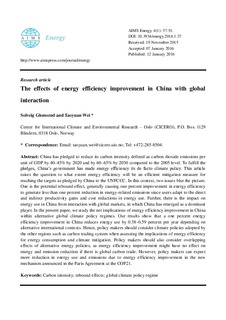| dc.contributor.author | Glomsrød, Solveig | |
| dc.contributor.author | Wei, Taoyuan | |
| dc.date.accessioned | 2017-11-09T12:59:54Z | |
| dc.date.available | 2017-11-09T12:59:54Z | |
| dc.date.created | 2016-01-12T09:55:54Z | |
| dc.date.issued | 2016 | |
| dc.identifier.citation | AIMS Energy. 2016, 4 (1), 37-51. | |
| dc.identifier.issn | 2333-8326 | |
| dc.identifier.uri | http://hdl.handle.net/11250/2465270 | |
| dc.description.abstract | China has pledged to reduce its carbon intensity defined as carbon dioxide emissions per unit of GDP by 40–45% by 2020 and by 60–65% by 2030 compared to the 2005 level. To fulfill the pledges, China’s government has made energy efficiency its de facto climate policy. This article raises the question to what extent energy efficiency will be an efficient mitigation measure for reaching the targets as pledged by China to the UNFCCC. In this context, two issues blur the picture. One is the potential rebound effect, generally causing one percent improvement in energy efficiency to generate less than one percent reduction in energy-related emissions since users adapt to the direct and indirect productivity gains and cost reductions in energy use. Further, there is the impact on energy use in China from interaction with global markets, in which China has emerged as a dominant player. In the present paper, we study the net implications of energy efficiency improvement in China within alternative global climate policy regimes. Our results show that a one percent energy efficiency improvement in China reduces energy use by 0.38–0.59 percent per year depending on alternative international contexts. Hence, policy makers should consider climate policies adopted by the other regions such as carbon trading system when assessing the implications of energy efficiency for energy consumption and climate mitigation. Policy makers should also consider overlapping effects of alternative energy policies, as energy efficiency improvement might have no effect on energy and emission reduction if there is global carbon trade. However, policy makers can expect more reduction in energy use and emissions due to energy efficiency improvement in the new mechanism announced in the Paris Agreement at the COP21. | |
| dc.language.iso | eng | |
| dc.title | The effects of energy efficiency improvement in China with global interaction | |
| dc.type | Peer reviewed | |
| dc.type | Journal article | |
| dc.description.version | publishedVersion | |
| dc.source.pagenumber | 37-51 | |
| dc.source.volume | 4 | |
| dc.source.journal | AIMS Energy | |
| dc.source.issue | 1 | |
| dc.identifier.doi | 10.3934/energy.2016.1.37 | |
| dc.identifier.cristin | 1310635 | |
| dc.relation.project | Norges forskningsråd: 209701 | |
| cristin.unitcode | 7475,0,0,0 | |
| cristin.unitname | CICERO Senter for klimaforskning | |
| cristin.ispublished | true | |
| cristin.fulltext | original | |
| cristin.qualitycode | 1 | |
